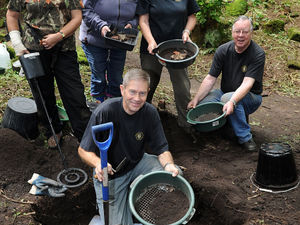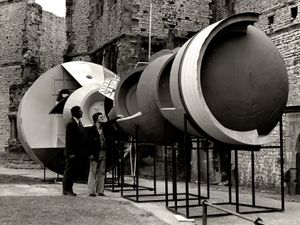The day the furnaces fell silent at Round Oak Steel Works
It was a tea break Michael Lyon will never forget. The crane operator at Round Oak Steel Works was taking a breather in the rest room with about 25 workmates when reports came through on the radio that their plant would be closing, with the loss of 1,200 jobs.
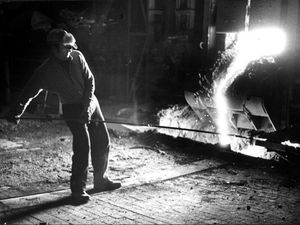
“It was the first we had heard about it,” he says in a state of disbelief. “Apparently the union had known about it for some time.
“We were just totally shocked, there were quite a few swear words and words about the union man. It wasn’t very pleasant.”
It is 40 years since Round Oak, the last major steel plant in the West Midlands, shut its doors for the last time.
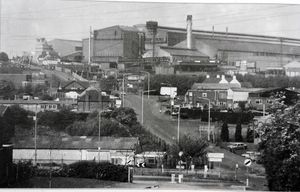
Just a few years earlier, half of the Black Country had reverberated to the dull thud of the steel-making industry, the smoking chimneys of Round Oak in Brierley Hill, Patent Shaft in Wednesbury, and Stewarts and Lloyds in Bilston, forming the backdrop to the Black Country skyline.
But by Christmas 1982 they had all been consigned to history.
Bilston was the first to close in 1979, and Patent Shaft followed suit the following year. But all the hopes that this rationalisation would secure the future of Round Oak, which had been preparing to celebrate its 125th anniversary, melted away like a lump of pig iron entering a furnace.

Michael, now 81, had been with the company for 14 years when the plant closed. His son, Ian, who worked as an apprentice bricklayer at the works, also lost his job.
“It was a fantastic place to work, I enjoyed going to work every day, I don’t think there are a lot of people who can say that,” says Michael.
“Everybody helped each other out. If anything went wrong we all pulled together, you would never get anybody say ‘that’s not my job’.
“The bosses there would bend for you as well, they would try to help you, and then when they wanted a favour, you would give them the favour back.”

Round Oak was founded in 1857 by William Ward, who would become Earl of Dudley, as an outlet for the pig iron from the blast furnaces which proliferated in the area. At the height of the industrial revolution, most of the world’s iron was made within 20 miles of the plant.
The earl already owned coal and iron mines, limestone quarries, sand-pits and blast furnaces, and his agent Richard Smith saw a large, modern ironworks as the perfect way to use these resources.
He bought 28 acres of land, a private railway, mines and minerals under the land from the Earl of Aberdeen, and the plant quickly built up a reputation, winning a medal at the 1862 International Exhibition for “fine collection of iron of good quality”.

As steel began to replace iron in the 1880s, the plant was rebuilt on a much larger scale, and the five chimneys which towered above Brierley Hill become known as ‘The Cunarder’, because of their resemblance to a giant cruise ship.
Michael, who lives in Kinver, says jobs at Round Oak were much sought after in the steel trade when he joined as a 27-year-old in 1968.
“At the time, I was working for Titan Steel Wheel at Cookley, near Kidderminster,” he says. “In those days it was very hard to get a job at Round Oak. You usually had to know somebody who already worked there, but funnily enough, I just applied for a job and got accepted.”
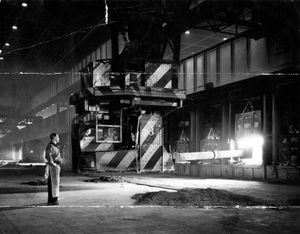
At its peak, 3,000 people were employed at the 50-acre site, but the 1970s saw a big fall in demand and 1,750 jobs were cut in the three years prior to closure.
Just two months before closure, personnel director Ian Copland had assured the remaining workers that their jobs were safe.
He said he had believed that the rationalisation of Britain’s steel industry would have meant that the plant could survive.
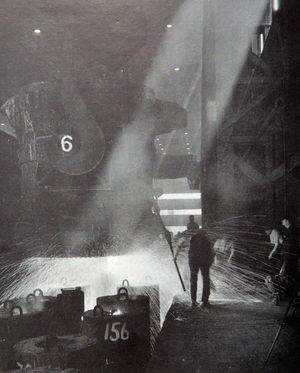
“However, these efforts have come to nothing,” he said, when closure was announced on November 17, 1982.
The previous year, Tube Investments, which had a 50 per cent stake, had sold its interest to state-owned British Steel Corporation. It had been reported that the works had been making heavy losses.
Bill Sirs of the Iron and Steel Trades Confederation blamed cut-price imported steel for the plant’s decline, and said the UK had been “double-crossed” by Common Market countries such as France, Germany and Italy, when it agreed to cut back on steel production to ease a surplus in other European countries.
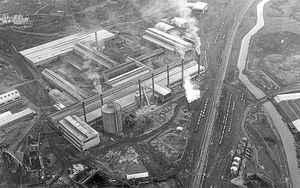
Labour leader Michael Foot pledged to try to save the plant, and the Government agreed to look at a rescue package put forward by Dudley West Tory MP John Blackburn.
But it was all to no avail.
Michael Lyon remembers a sombre mood in the plant on the last day.
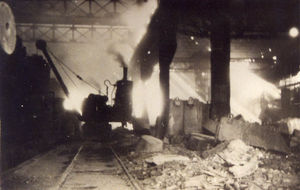
“At noon they told us we could go if we wanted, and most just ran out as soon as it was time,” he says.
“They provided this lady who was supposed to be an expert, but she told me I had had it – she said I would never work again, I was too old. I was 41.”
After leaving Round Oak, Michael set up taxi and window cleaning businesses.
Buildings like the main office block in Dudley Road survive to this day, but most of the works was demolished in 1984.
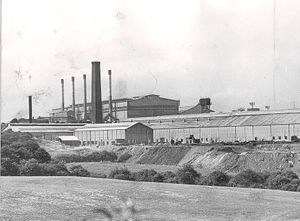
In 1980, the adjacent Merry Hill Farm had been declared an Enterprise Zone by the Government in a bid to bring investment into the area, and would soon be developed as the Merry Hill shopping centre. Following Round Oak's closure, the zone was extended to include the steelworks, which became the Waterfront office and leisure park.
Michael says: “I can still recognise where I worked, in the No. 3 bay, right opposite the Blue Brick pub,” he says.
Occasionally he goes back to the site do a spot of shopping, but not very often.
“They’ve had my job off me – they’re not having my money too.”

